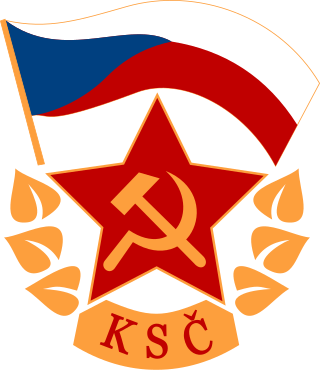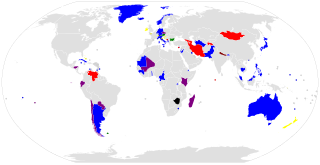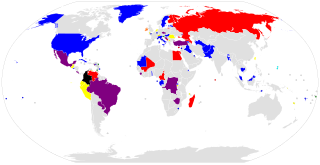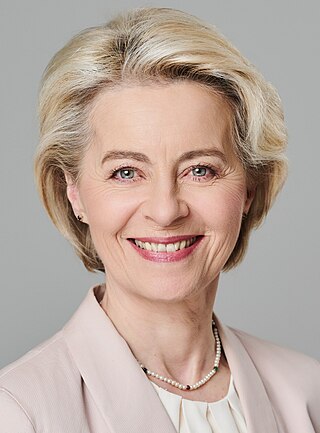
The Czech Republic is a unitary parliamentary republic, in which the president is the head of state and the prime minister is the head of government. Executive power is exercised by the Government of the Czech Republic, which reports to the Chamber of Deputies. The legislature is exercised by the Parliament. The Czech Parliament is bicameral: the upper house of the Parliament is the Senate, and the lower house is the Chamber of Deputies. The Senate consists of 81 members who are elected for six years. The Chamber of Deputies consists of 200 members who are elected for four years. The judiciary system is topped by the trio of the Constitutional Court, Supreme Court and Supreme Administrative Court.

The Communist Party of Czechoslovakia was a communist and Marxist–Leninist political party in Czechoslovakia that existed between 1921 and 1992. It was a member of the Comintern. Between 1929 and 1953, it was led by Klement Gottwald. The KSČ was the sole governing party in the Czechoslovak Socialist Republic though it was a leading party along with the Slovak branch and four other legally permitted non-communist parties. After its election victory in 1946, it seized power in the 1948 Czechoslovak coup d'état and established a one-party state allied with the Soviet Union. Nationalization of virtually all private enterprises followed, and a command economy was implemented.
The government of Czechoslovakia under Marxism–Leninism was in theory a dictatorship of the proletariat. In practice, it was a one-party dictatorship run by the Communist Party of Czechoslovakia, the KSC.

The Constitution of the Czech Republic is the supreme law of the Czech Republic. The current constitution was adopted by the Czech National Council on 16 December 1992. It entered into force on 1 January 1993, replacing the 1960 Constitution of Czechoslovakia and the constitutional act No. 143/1968 Col., when Czechoslovakia gave way to the Slovak Republic and the Czech Republic in a peaceful dissolution.

Czech National Social Party is a civic nationalist political party in the Czech Republic, that played an important role in Czechoslovakia during the interwar period. It was established in 1897 by break-away groups from both the national liberal Young Czech Party and the Czech Social Democratic Party, with a stress on achieving independence of the Czech lands from Austria-Hungary. Its variant of socialism was moderate and reformist rather than a Marxist one. After the National Labour Party dissolved and merged with National Socialists in 1930, the party also became the refuge for Czech liberals. Its best-known member was Edvard Beneš, a co-founder of Czechoslovakia and the country's second President during the 1930s and 1940s.

The Civic Conservative Party is a centre-right liberal conservative political party in Slovakia. It has one seat in the National Council, following the 2023 election. It has also representation at regional and local level.

All elections in the Czech Republic are based on the principle of universal suffrage. Any adult citizen who is at least 18 years old can vote, except those who have been stripped of their legal capacities by a court, usually on the basis of mental illness. Elected representatives are elected directly by the citizens without any intermediaries. Election laws are not part of the constitution, but – unlike regular laws – they cannot be changed without the consensus of both houses of the Parliament. The Czech Republic uses a two-round plurality voting system for the presidential and Senate elections and an open party-list proportional representation system for all other elections. The proportional representation system uses the Sainte-Laguë method for allocating seats.

The Federal Assembly was the highest organ of state power of Czechoslovakia from 1 January 1969 until the amendment of the state constitution on 23 April 1990. From 23 April 1990 until the dissolution of Czechoslovakia on 31 December 1992, it functioned as the state's federal legislature.

Ján Čarnogurský is a Slovak former politician, who served as the Prime Minister of Slovakia (1991–1992), the former chairman of the Christian Democratic Movement (1990–2000), author and columnist. Today he is chairman of Slovak-Russian association with headquarters in Bratislava.

Elections to the Swiss Federal Assembly, the federal parliament of Switzerland, were held on Sunday, 21 October 2007. In a few cantons, a second round of the elections to the Council of States was held on 11 November, 18 November, and 25 November 2007. For the 48th legislative term of the federal parliament (2007–2011), voters in 26 cantons elected all 200 members of the National Council as well as 43 out of 46 members of the Council of States. The other three members of the Council of States for that term of service were elected at an earlier date.

The Czech Pirate Party often known simply as the Pirates is a liberal progressive political party in the Czech Republic, founded in 2009. The party was founded as a student-driven grassroots movement campaigning for political transparency, civil rights and direct democracy.
Women in Switzerland gained the right to vote in federal elections after a referendum in February 1971. The first federal vote in which women were able to participate was the 31 October 1971 election of the Federal Assembly. However it was not until a 1990 decision by the Federal Supreme Court of Switzerland that women gained full voting rights in the final Swiss canton of Appenzell Innerrhoden.

Parliamentary elections were held in Czechoslovakia on 26 and 27 November 1971. They were the first held after the Constitutional Act on the Czechoslovak Federation converted Czechoslovakia into a federal republic, comprising the Czech Socialist Republic and the Slovak Socialist Republic, as well as the first elections in Czechoslovakia held in the aftermath of the Prague Spring.

This national electoral calendar for 2013 lists the national/federal elections held in 2013 in all sovereign states and their dependent territories. By-elections are excluded, though national referendums are included.

Jiří Dienstbier Jr. is a Czech politician, lawyer and the Senator for Kladno from 2011 to 2020, representing the Social Democratic Party (ČSSD). He previously served as Minister for Human Rights, Equal Opportunities and Legislation in Bohuslav Sobotka's cabinet, and at various points he has been Deputy Leader of ČSSD, a member of the Chamber of Deputies, and shadow minister of Justice. He was also the ČSSD candidate for the first direct presidential elections in the Czech Republic in 2013.
Indirect National Council elections were held in the Czech part of Czechoslovakia on 10 June 1968, the first time Czechs had elected their own legislature. Of the 200 members of the National Council, 150 were elected indirectly by the National Assembly, whilst the other 50 members were elected by the National Council itself on 21 November 1968.

This national electoral calendar for 2018 lists the national/federal elections held in 2018 in all sovereign states and their dependent territories. By-elections are excluded, though national referendums are included.

Volt Europa is a pro-European and federalist European political alliance. It operates as a pan-European umbrella for subsidiary parties sharing the same name and branding. Despite its organisation and being referred to as a "European party" or "transnational party", Volt does not yet meet the requirements to register as a European political party.

The Victorian Liberal Party, officially known as the Liberal Party of Australia (Victorian Division) and branded as Liberal Victoria, is the state division of the Liberal Party of Australia in Victoria. It was formed in 1944. It became the Liberal and Country Party (LCP) in 1949, and simplified its name to the Liberal Party in 1965. The party sits on the centre-right to right-wing of the Australian political spectrum.

The 2024 European Parliament election was held in the European Union (EU) between 6 and 9 June 2024. It was the tenth parliamentary election since the first direct elections in 1979, and the first European Parliament election after Brexit. A total of 720 Members of the European Parliament (MEPs) were elected to represent more than 450 million people from 27 member states. This election also coincided with a number of other elections in some European Union member states.

















